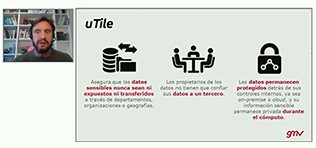What if we could improve our algorithms without compromising data privacy?

The AI & Big Data Congress clearly brought out how artificial intelligence’s prediction capability can give companies an edge over the rest. An early takeup of this technology could therefore boost economic activity and generate jobs, while also help to bring companies more into line with today’s environment.
The bugbear here, the burning issue in discussions of the ethical and legal ramifications of AI takeup, is the knock-on effect on data privacy. The General Data Protection Regulation (GDPR) sets out to safeguard EU citizens’ privacy and give them greater control over their personal data. Many have cast doubt on whether it is possible to use AI while protecting the fundamental rights watched over by the GDPR and other protection measures applied by governments and organizations to keep this information private, decentralized and secure.
Enter uTile. During the AI & Big Data Congress session dealing the fairness of AI algorithms, José Carlos Baquero, Artificial Intelligence and Big Data Manager of GMV’s Secure e-Solutions sector, explained how GMV’s inhouse development uTile enables us to improve our algorithms without undermining data privacy. Thanks to uTile organizations can now share and even securely monetize their data insights, on the strength of advanced encrypted computation procedures, complying with the privacy of distributed data sources and facilitating secure information exchange. We will, for example, be able to harness sensitive data in order to improve analytical models and machine-learning algorithms.
SEE COMPLETE INTERVENTION (VIDEO): How to improve your algorithms without compromising data privacy In Spanish)